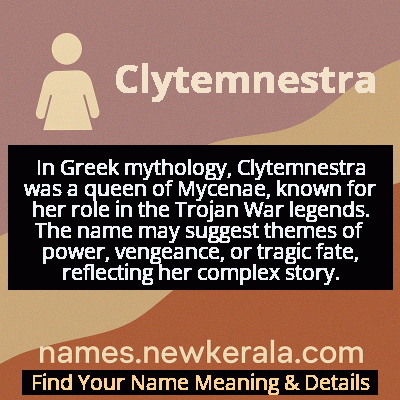Clytemnestra Name Meaning & Details
Origin, Popularity, Numerology Analysis & Name Meaning of Clytemnestra
Discover the origin, meaning, and cultural significance of the name CLYTEMNESTRA. Delve into its historical roots and explore the lasting impact it has had on communities and traditions.
Name
Clytemnestra
Gender
Female
Origin
Greek
Lucky Number
2
Meaning of the Name - Clytemnestra
In Greek mythology, Clytemnestra was a queen of Mycenae, known for her role in the Trojan War legends. The name may suggest themes of power, vengeance, or tragic fate, reflecting her complex story.
Clytemnestra - Complete Numerology Analysis
Your Numerology Number
Based on Pythagorean Numerology System
Ruling Planet
Moon
Positive Nature
Diplomatic, friendly, artistic, empathetic.
Negative Traits
Over-sensitive, moody, indecisive, prone to self-pity.
Lucky Colours
Green, cream, white.
Lucky Days
Monday.
Lucky Stones
Pearl, moonstone.
Harmony Numbers
1, 3, 4.
Best Suited Professions
Diplomats, mediators, caregivers, artists.
What People Like About You
Cooperative spirit, friendliness, artistic talent.
Famous People Named Clytemnestra
Clytemnestra (Mythological Queen)
Mythological Figure
Central character in the Oresteia who murdered King Agamemnon
Clytemnestra in Aeschylus' Plays
Literary Character
Complex antagonist/protagonist in ancient Greek tragedy
Clytemnestra in Modern Retellings
Cultural Symbol
Feminist reinterpretation in contemporary literature and scholarship
Name Variations & International Equivalents
Click on blue names to explore their detailed meanings. Gray names with will be available soon.
Cultural & Historical Significance
Throughout history, Clytemnestra has been reinterpreted through changing cultural lenses. Victorian era often portrayed her as a monstrous femme fatale, while 20th century feminist scholarship reclaimed her as a victim of patriarchal oppression fighting for agency. Contemporary adaptations frequently emphasize her maternal motivations and the political context of her actions. Her enduring cultural relevance lies in her complexity—she is simultaneously queen, mother, murderer, and avenger. This multidimensionality makes her a perpetual subject of artistic and scholarly interest, representing the ongoing negotiation between individual agency and social constraints.
Extended Personality Analysis
The name Clytemnestra evokes personality traits of formidable intelligence, strategic brilliance, and intense emotional depth. Individuals associated with this name typically demonstrate exceptional willpower and the capacity for long-term planning. They possess a commanding presence that combines traditional authority with unconventional thinking. Their loyalty to family and principles is absolute, though this devotion can manifest in controversial ways when they feel betrayed or threatened. These personalities often display a unique blend of nurturing instincts and fierce protectiveness that can turn aggressive when their loved ones are endangered.
Clytemnestra-types are natural leaders who understand power dynamics intuitively. They excel in situations requiring both emotional intelligence and strategic calculation. While they may be perceived as intimidating or controversial, their actions are typically driven by deep moral convictions rather than mere ambition. Their complexity means they often struggle with internal conflicts between different aspects of their identity—particularly the tension between societal expectations and personal integrity. These individuals leave indelible marks on their communities through their uncompromising approach to life's challenges and their willingness to confront injustice directly, regardless of personal cost.
Modern Usage & Popularity
In contemporary naming practices, Clytemnestra remains an extraordinarily rare choice, typically selected by parents with strong interests in classical literature, mythology, or feminist history. The name's usage is almost exclusively limited to academic families, artists, or those making deliberate statements about female empowerment. According to social security records and international naming databases, Clytemnestra appears so infrequently that it doesn't register on standard popularity charts. Modern parents who choose this name often appreciate its historical depth and the opportunity to reclaim a controversial female figure. The name's substantial length and dramatic associations make it impractical for everyday use in most cultures, though it occasionally appears in literary contexts or as a middle name. Its modern usage represents a conscious rejection of conventional feminine naming in favor of powerful mythological resonance and intellectual sophistication.
Symbolic & Spiritual Meanings
Symbolically, Clytemnestra represents the ultimate challenge to established power structures and the moral complexity of retributive justice. She embodies the archetype of the wronged woman who transforms her victimhood into agency through drastic action. Her story symbolizes the tension between law and morality, between institutional justice and personal vengeance. Metaphorically, she represents the shadow side of feminine power—the capacity for violence that exists alongside nurturing qualities when fundamental bonds are violated.
The name carries profound symbolic weight regarding maternal devotion and its potential for destructive transformation. She symbolizes the political intelligence often denied to women in patriarchal narratives and the consequences of silencing female voices. In psychological terms, Clytemnestra represents the integration of shadow aspects—the acknowledgment that strength and violence, love and revenge, can coexist within the same personality. Her enduring symbolic power lies in her refusal to be simplified into either villain or victim, instead representing the uncomfortable truth that justice and morality are rarely absolute in human experience.

